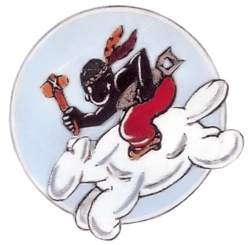647th Bombardment Squadron
| 647th Bombardment Squadron | |
|---|---|
|
Emblem of the 647th Bombardment Squadron | |
| Active | 1943-1945 |
| Country | United States |
| Branch | United States Air Force |
| Type | Bombardment |
The 647th Bombardment Squadron is an inactive United States Air Force unit. It was last assigned to the 410th Bombardment Group. It was last stationed at Myrtle Beach Army Airfield, South Carolina, and was inactivated on 7 November 1945.
History
Established as a Third Air Force A-20 Havoc light bomber Operational Training Unit in mid-1943; Deployed to European Theater of Operations (ETO) in mid-1944; assigned to Ninth Air Force in England.
Entered combat in May 1944 and helped to prepare for the invasion of Normandy by assaulting coastal defenses, airfields, and V-weapon sites in France, and marshalling yards in France and Belgium. Supported the invasion in June by bombing gun positions and railway choke points. Assisted ground forces at Caen and St Lo in July and at Brest in August and September by attacking bridges, vehicles, fuel and ammunition dumps, and rail lines.
Moved to France in Sept, and through mid-December struck defended villages, railroad bridges and overpasses, marshalling yards, military camps, and communications centers to support the Allied assault on the Siegfried Line. Participated in the Battle of the Bulge, December 1944-January 1945, by pounding marshalling yards, railheads, bridges, and vehicles in the battle area. Continued to fly support and interdictory missions, aiding the drive across the Rhine and into Germany, February–April 1945, continuing attacks on enemy forces until the German Capitulation in May 1945.
Most of the squadron was demobilized during the summer of 1945; squadron returned to the United States and was assigned to Seymour Johnson Field, then Myrtle Beach Army Airfield, however was minimally manned and equipped. Inactivated in November 1945.
Lineage
- Constituted 647th Bombardment Squadron (Light) on 16 Jun 1943
- Activated on 1 Jul 1943
- Inactivated on 7 Nov 1945
Assignments
- 410th Bombardment Group, 1 Jul 1943-7 Nov 1945
Stations
|
|
Aircraft
- A-20 Havoc, 1944-1945
- A-26 Invader, 1945
References
![]() This article incorporates public domain material from the Air Force Historical Research Agency website http://www.afhra.af.mil/.
This article incorporates public domain material from the Air Force Historical Research Agency website http://www.afhra.af.mil/.
- Maurer, Maurer, ed. (1982) [1969]. Combat Squadrons of the Air Force, World War II (PDF) (reprint ed.). Washington, DC: Office of Air Force History. ISBN 0-405-12194-6. LCCN 70605402. OCLC 72556.
